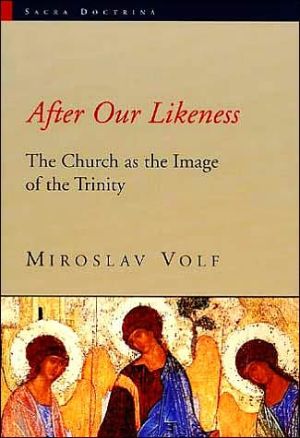

 |

|

The average rating for After Our Likeness: The Church as the Image of the Trinity (Sacra Doctrina Series) based on 2 reviews is 3.5 stars.
Review # 1 was written on 2016-05-26 00:00:00 Kyle Blanks Kyle BlanksVolf's Exclusion and Embrace is one of my all-tie favorites and his book Allah, discussing the similarities and differences between the Muslim and Christian conceptions of God is a must-read for any interested in the topic. This book is about the church, or ecclesiology for people who like big theological words. Volf spends the first 1/3 of the book setting out the views of Joseph Ratzinger (who became Pope Benedict), representing Roman Catholics, and John Zizoulas, representing Eastern Orthodox. These are Volf's dialogue partners and they have much in common, but of course much that sets them apart. Volf's arguments are in favor of a "Free Church" view. I don't think he actually defines what he means, though it is clear he is talking about churches that have a congregational government and are more "low church" as opposed to the Catholics and Orthodox. It was interesting he did not really mention mainline Protestants who do have some sort of hierarchy and how their understanding of ecclesiology relates. That aside, as the title says, Volf's understanding of the Trinity plays a huge part in his understanding of the Church. Just as God is inherently relational, so there is no such thing as a Christian without community. And as opposed to Ratzinger/Zizoulas who both emphasize the larger role of bishops and the "universal" church, Volf argues the local church is formed through the Holy Spirit. There is no "catholicity" to be given from a bishop or higher governing body, this comes from the Spirit and Christ in each local congregation. Also important for Volf is that the universal (catholic) church in some form does not exist yet. Drawing on the eschatology of people like Moltmann, Volf sees the church as drawing us towards a future when it will be one church fully unified. Looking to that time, we aim for unity in our diversity today. Overall, not a thrilling book. I've not read much ecclesiology since whatever was required in seminary. I appreciate the connections to the Trinity, clearly a theme that drives Volf. I could see any pastor of a "Free Church" appreciating this book and being moved by it. |
Review # 2 was written on 2017-06-13 00:00:00 Donna Budlong Donna BudlongThis book is an important contribution to ecumenical dialogue on the nature of the church, providing a perspective that is often neglected: the catholicity of the free church tradition. Volf anchors his unique approach in the perichoretic understanding of the Trinity and methodologically approaches his topic in conversation (and critique) of two ecclesiologies representing the Catholic and Orthodox positions: Joseph Ratzinger (later Pope Benedict XVI) and John Zizioulas. Herein is my biggest reservation about this otherwise highly insightful book. Each of these representative figures are only singular aspects of their traditions and by no means represent the whole or "official" view. This would have been a better book with a more general analysis of the two traditions. Another reservation is Volf's radical demoncratization of church structures. He doesn't dismiss the validity of episcopal structures but argues for the validity of non-episcopal structures as well, which, he argues, may even at times be better suited for a particular time period and culture. A better alternative and more theologically consistent one may be to see where heirarchical ecclesial structures exist alongside a laity which exerts a robust authority. What is so promising about the modern ecumenical movement is not the legitimizing of diversity in the name of a perichoretic catholicity but the integration of the priesthood of all believers with the ministerial priesthood. From a Catholic perspective, we're not yet where we need to be in this regard, but we're moving in that direction. Volf's book, even when qualified, can help us get there. |
CAN'T FIND WHAT YOU'RE LOOKING FOR? CLICK HERE!!!